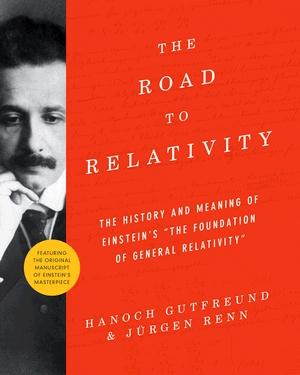Jul 20 2015
On November 25, 1915, Albert Einstein submitted his final version of the general theory of relativity to the Prussian Royal Academy. Einstein's revolutionary explanation of how gravity works had far-reaching consequences. Not only does the theory accurately explain the motion of the planets; it also describes the history and expansion of the universe, the physics of black holes, and the bending of light from distant stars and galaxies. Over the years, the radical ideas that a 35-year-old Einstein proposed 100 years ago have been confirmed by many observations and experiments.
 This is the book cover for The Road to Relativity: The History and Meaning of Einstein's 'The Foundation of General Relativity', published by Princeton University Press.
This is the book cover for The Road to Relativity: The History and Meaning of Einstein's 'The Foundation of General Relativity', published by Princeton University Press.
Marking the centenary of this remarkable achievement, Princeton University Press today announced the publication of two new books:
THE ROAD TO RELATIVITY: The History and Meaning of Einstein's "The Foundation of General Relativity"
By Hanoch Gutfreund and Jürgen Renn
Featuring the original manuscript of Einstein's masterpiece
(http://press.princeton.edu/titles/10444.html)
and
RELATIVITY: The Special and General Theory, 100th Anniversary Edition
With commentaries and background material by Hanoch Gutfreund and Jürgen Renn
Featuring the original manuscript by Albert Einstein
(http://press.princeton.edu/titles/10434.html)
The co-authors are renowned experts in the field. Prof. Hanoch Gutfreund is professor emeritus of theoretical physics and a former president of the Hebrew University of Jerusalem, where he currently serves as the academic director of the university's Albert Einstein Archives. Prof. Jürgen Renn, whose books include The Genesis of General Relativity, is director of the Max Planck Institute for the History of Science in Berlin.
In THE ROAD TO RELATIVITY: The History and Meaning of Einstein's "The Foundation of General Relativity," Profs. Gutfreund and Renn provide an English translation of Einstein's paper, accompanied by insightful page-by-page commentary that places the text in historical and scientific context. Gutfreund and Renn's concise introduction traces Einstein's journey from special to general relativity, and their essay "The Charm of a Manuscript" provides a delightful meditation on the varied afterlife of Einstein's text.
Featuring an enthralling foreword by John Stachel, THE ROAD TO RELATIVITY is a handsome edition that also includes a biographical glossary, describing the intellectuals that influenced or were influenced by Einstein and his work; a comprehensive bibliography; suggestions for further reading; and numerous photos and illustrations throughout.
In RELATIVITY: The Special and the General Theory, 100th Anniversary Edition, Gutfreund and Renn present a new edition of the celebrated book that Einstein wrote about relativity for a popular audience. Einstein's intention was "to give an exact insight into the theory of relativity to those readers, who, from a general scientific and philosophical point of view, are interested in the theory, but who are not conversant with the mathematical apparatus of theoretical physics."
This new edition features an authoritative English translation of the text, along with an introduction and reading companion by Gutfreund and Renn that examines the evolution of Einstein's thinking and casts his ideas in a broader present-day context. A special chapter explores the history of and the stories behind the early foreign-language editions in light of the reception of relativity in different countries.
This edition also includes a survey of the introductions from those editions; covers from selected early editions; a letter from Walther Rathenau to Einstein discussing the book; and a revealing sample from Einstein's handwritten manuscript. No other edition contains such a wealth of new and authoritative material, framing Einstein's popular level book for a new century of readers.
Albert Einstein was a founder of the Hebrew University and one of its most loyal supporters. Einstein bequeathed his writings and intellectual heritage to the Hebrew University, including the rights to his image.
In December of 2014, the Hebrew University, in partnership with Princeton University Press and the California Institute of Technology, announced the launch of the Digital Einstein Papers. The Hebrew University and Princeton University Press have spent decades studying an estimated 80,000 Einstein documents. Now anyone with an Internet connection can access transcripts of thousands of Einstein's letters, papers, postcards and diaries at the Digital Einstein Papers, at http://einsteinpapers.press.princeton.edu.
The Digital Einstein Papers contain text transcripts that link to many high-quality digital images at the Hebrew University's Einstein Archive Online, at http://www.alberteinstein.info. Launched in March 2012 by the university's Albert Einstein Archives, and sponsored by the UK Polonsky Foundation, the Einstein Archive Online presents a complete catalog of more than 80,000 Einstein-related documents in the university's possession, along with many high-quality digital images.
The Hebrew University of Jerusalem is Israel's leading academic and research institution, producing one-third of all civilian research in Israel. For more information, visit http://new.huji.ac.il/en.